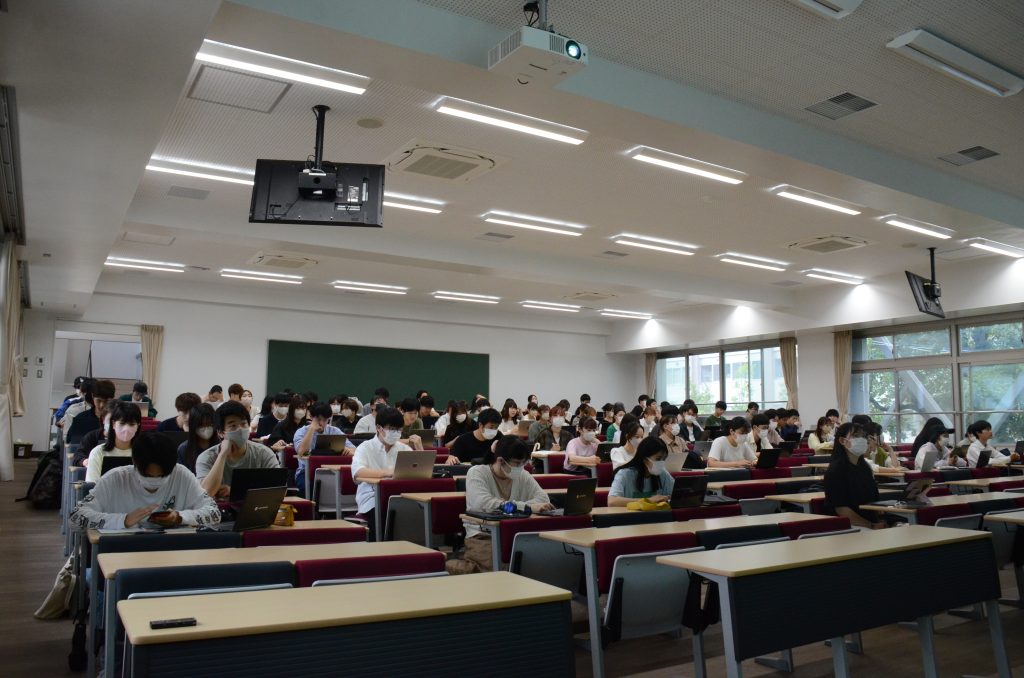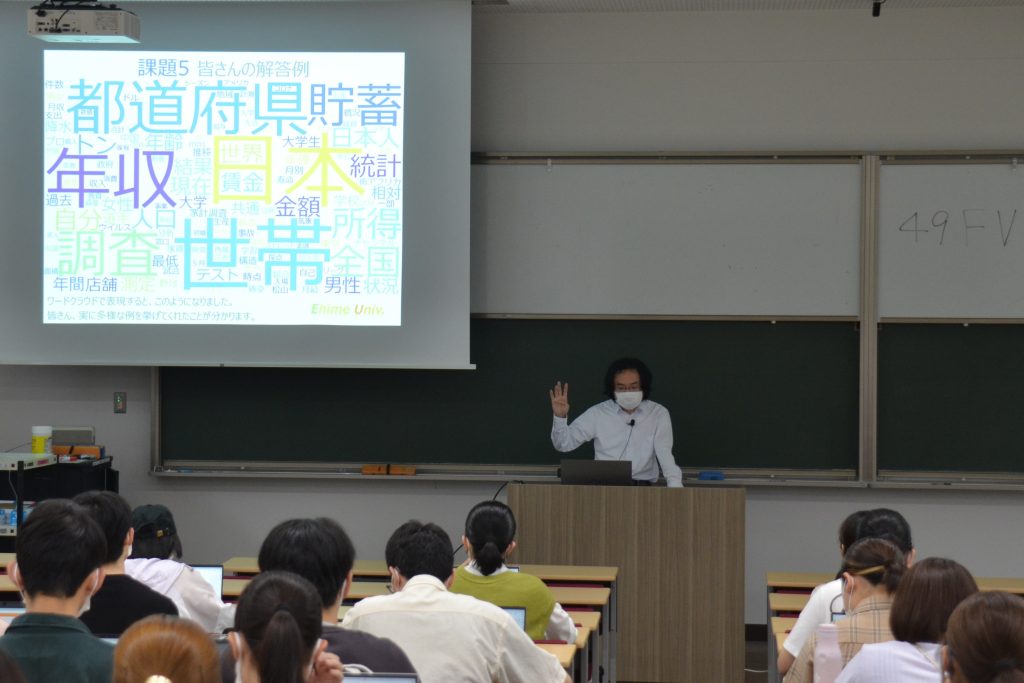The purpose of this class is to learn the basics of methods for objectively analyzing various types of data from scientific knowledge, with emphasis on mathematical thinking, as knowledge and ability in data analysis are becoming indispensable both for studying specialized fields at university and for being active in society after graduation.
Lesson Content
This class is mainly for first-year students, and the day of the interview was the seventh lecture, with a lecture room full of students attending.
No textbooks will be used, but materials will be provided through Moodle, an e-Learning learning management system. All students open their individual computers and attend class.
The teacher will give you an assignment in advance and you are expected to read the material carefully.
The class began with an explanation of the assignment. This time, the assignment was a discussion of mean, median, and mode. In explaining that “it is not always meaningful to take the average at any given time,” Matsuura-sensei used data related to baseball, his favorite sport, as an example for easy understanding.


He then went on to explain about correlations, and as a review of the previous lesson, he discussed the fact that just because two variables are correlated does not mean that there is a causal relationship.
Later in the day’s class, a more detailed explanation was then given on the positive correlation of an upward shift and the negative correlation of a downward shift, using correlation coefficients. The materials were lined with formulas using Σ (sigma), which at first glance seemed difficult, but in reality, the focus was not on performing difficult calculations, but on explaining what is sought by the formulas and the meaning of the calculated data, allowing students to learn what they should pay attention to when handling data.
He also explained the importance of drawing scatter plots, saying, “Sometimes you can see things by graphing the data first, before doing any messy calculations. He emphasized, “Using a computer allows us to perform difficult analyses, but before thinking too hard, we need to first determine the nature of the data, even if it is in a primitive way. These words were impressive, and I felt that this was a fundamental lesson that would be useful for students as they pursue their research in specialized fields in the future.
Since this class is a quarter system with a total of 8 sessions, we are now in the period of summarizing, and at the end of the class, there was an explanation about the submission of reports. The evaluation criteria were also presented in detail, and I think it will be a good learning experience for first-year students who have just entered the university in April.
Throughout, specific examples are familiar and easy to understand, making this a truly “basic” class. Please take this course and make the most of it for your future research.
Comments from faculty
AI (Artificial Intelligence) and data science are now in the limelight worldwide, and countries are engaged in a fierce competition to develop and utilize them. In Japan, too, there is a growing awareness that the ability to utilize data is a fundamental skill essential for working people.
In this class, students learn the basic ways of looking at and handling data. What students learn in this class will be useful when analyzing experimental and observational data for graduation research, etc., and will also serve as a foundation for being active in society as “data-savvy individuals” after graduation. The Faculty of Science has a “Mathematics and Mathematical Informatics Course” that specializes in mathematics, data science, and AI, but this course is also open to students outside of this course, and in fact, the majority of Faculty of Science students take this course.
In class, in addition to everyday examples, I also give examples of data related to my personal interests in professional baseball (especially the Chunichi Dragons, whom I support) and overseas (especially Sweden, where I have lived). Of course, not all students are interested in professional baseball or foreign countries, but I still dare to discuss topics that I myself like. I believe that learning is not something to be learned reluctantly, but rather to be explored selflessly, driven by intellectual curiosity. In order to convey this, I believe it is important to show my own attitude that I enjoy analyzing data that interests me, and I put this into practice.
Even AI is not a “magic tool” that makes the impossible possible in principle. And it is the characteristic of the Faculty of Science’s education and research to explore these universal principles. Science and technology advance rapidly with the times, and what we learn in college becomes outdated day by day. However, the scientific principles learned in Faculty of Science classes are universal throughout life. We hope that the content of the “Fundamentals of Mathematical Informatics” course will also be a long-lasting foundation for students in their lives.
Student Comments
Mr. Yikumi Iwai, 1st year student, Faculty of Science
Are you thinking, “There must be a relationship between the two because they are correlated?” If this is the range of mathematics you learned before high school, you would think this way. In this lecture, you will learn the basics of methods for objectively analyzing data from a scientific perspective. Since there are multiple methods to analyze data, the professor will explain them with examples at the pace of one keyword per lecture. For example, you will learn that just because there is a correlation in some data does not necessarily mean that there is a causal relationship, and vice versa.
Through this class, I feel that my way of thinking about data has changed. I am now able to analyze data from various perspectives, such as numerical values and graphs, using the functions of Excel, rather than considering data from one direction.
Based on these points, we strongly recommend that anyone who wants to work in a profession that involves analyzing data in the future, or who is interested in data analysis, take this lecture.



